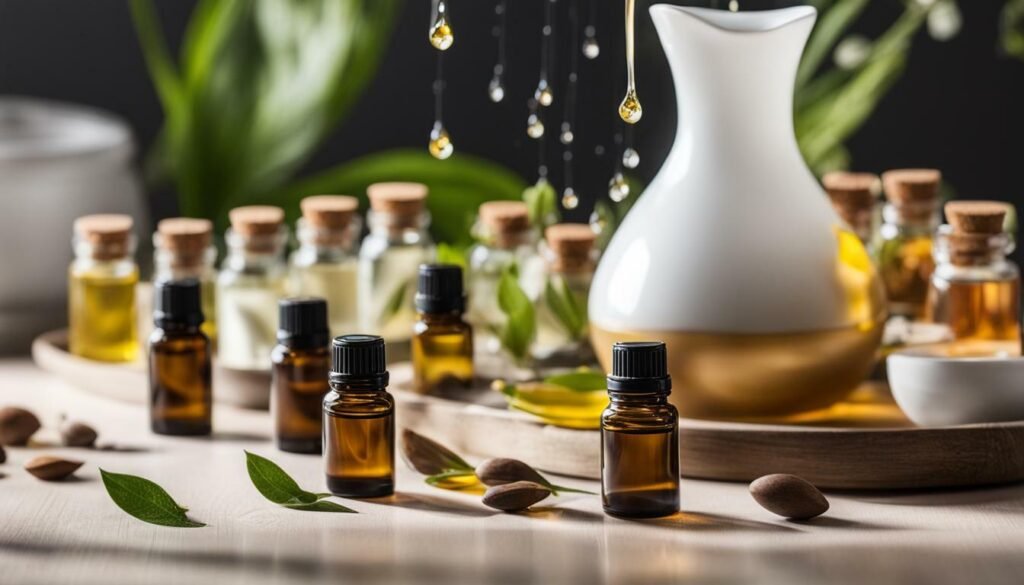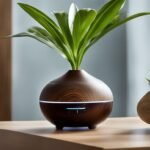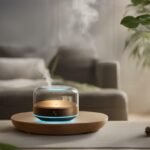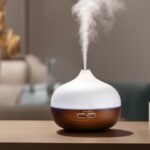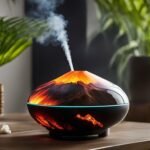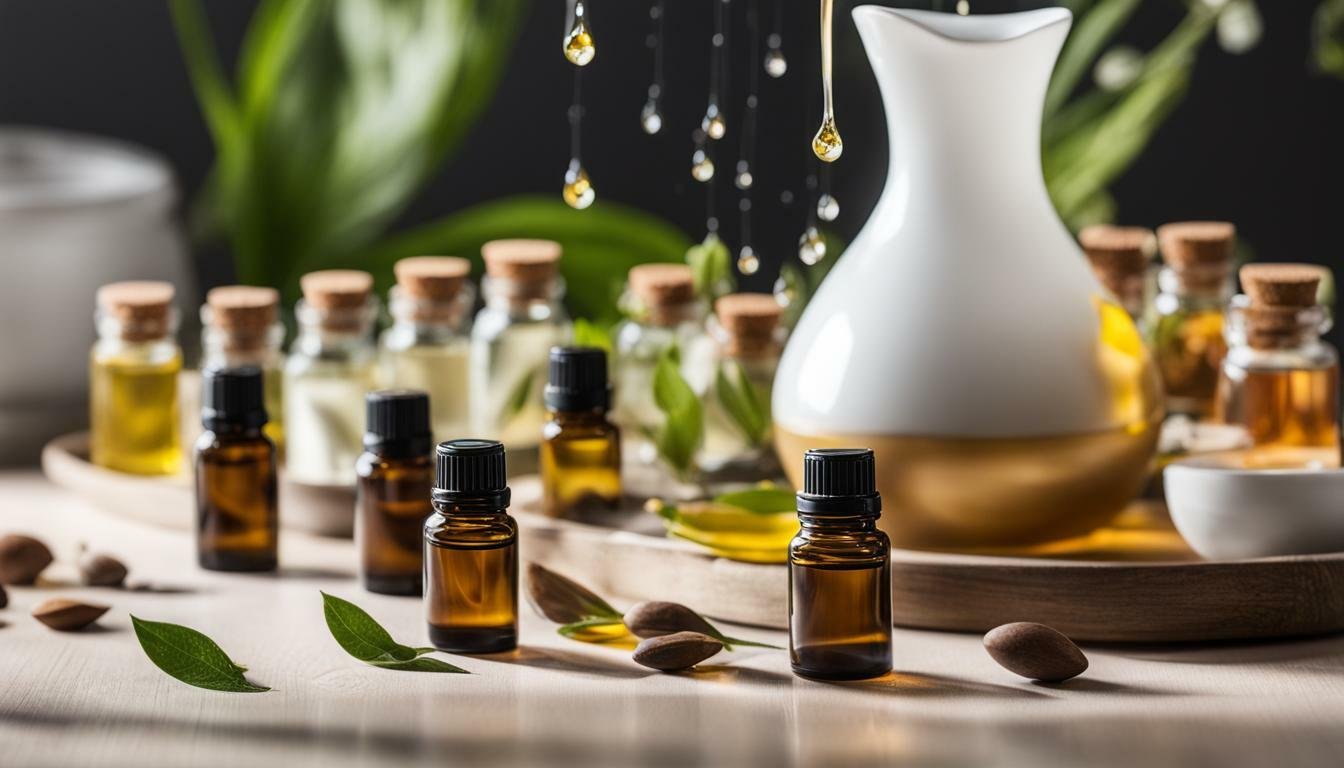
When using a 150ml diffuser, it is important to know how many drops of essential oil to use for optimal scenting of your space. Determining the right number of drops depends on various factors that should be taken into consideration.
Generally, it is recommended to start with 3-5 drops of essential oil for a 100ml diffuser. For a larger 150ml diffuser, a similar range can be used as a starting point. However, it’s crucial to consider the size of the space you are scenting and the potency of the oil you are using.
A larger space may require more drops to ensure the scent is noticeable, while a smaller space may require fewer drops to avoid overwhelming the area. Additionally, it is important to choose high-quality essential oils from trusted brands to ensure both safety and effectiveness.
Proper ventilation in the room where the diffuser is placed is also essential. Adequate airflow helps to balance the diffusion of scents and prevents them from becoming too overpowering, which can cause potential health issues.
Regular cleaning of the diffuser is crucial for optimal performance and to avoid unwanted mixing of smells. Cleaning the diffuser not only improves its efficiency but also ensures that the scent remains pure and true to its original intended fragrance.
Moreover, creating custom blends using different essential oils is a possibility. The measurements and combinations of custom blends depend on personal preferences and experimentation. You have the freedom to explore and find the perfect combination that suits your unique scenting preferences.
In conclusion, determining the number of drops of essential oil in a 150ml diffuser requires considering factors such as space size, oil potency, brand quality, ventilation, and personal preferences. By following these guidelines and experimenting with different scents, you can achieve an optimal scenting experience that enhances your space.
Factors to Consider for Proper Oil Usage
Factors such as the size of the space, potency of the oil, brand quality, and ventilation play a crucial role in determining the proper usage of essential oils in a diffuser. When deciding how many drops of essential oil to use in a 150ml diffuser, it is important to take these factors into account to achieve the desired scenting experience.
| Factor | Considerations |
|---|---|
| Size of the Space | A larger space may require more drops of essential oil to effectively distribute the scent, while a smaller space may require fewer drops. It is recommended to adjust the number of drops based on the square footage of the area being scented. |
| Potency of the Oil | The potency of essential oils can vary between different brands and types. Stronger oils may require fewer drops, while weaker oils may require more drops to achieve the desired strength of aroma. Refer to the instructions provided by the oil manufacturer for specific recommendations. |
| Brand Quality | Choosing high-quality essential oils from trusted brands ensures safety, effectiveness, and a more pleasant scenting experience. Look for oils that are pure, organic, and free from synthetic additives or fillers. |
| Ventilation | Proper ventilation in the room is essential for balanced scents and to avoid overwhelming aromas. Ensure there is adequate airflow by opening windows, using fans, or placing the diffuser in a well-ventilated area. |
By considering these factors, you can determine the appropriate number of drops of essential oil to use in your 150ml diffuser. However, it is important to note that personal preferences and experimentation also play a role. It is possible to create custom blends by combining different essential oils, but the specific measurements and combinations will depend on individual preferences and desired scent profiles.
Recommended Range for 150ML Diffuser
For a 150ml diffuser, a similar range of 3-5 drops, which is commonly recommended for a 100ml diffuser, can be used as a starting point. However, it is important to consider a few factors to determine the optimal number of drops for your specific situation.
Firstly, the size of the space being scented plays a role in the amount of essential oil needed. A larger space may require slightly more drops to ensure the scent is evenly distributed. On the other hand, a smaller room may benefit from using fewer drops to prevent an overpowering scent.
Secondly, the potency of the essential oil should be taken into account. Some oils are more concentrated than others, so you may need to adjust the number of drops accordingly. It is advisable to start with a smaller amount and gradually increase if necessary, in order to find the right balance of fragrance.
Lastly, personal preference also plays a role in determining the ideal number of drops. Some individuals prefer a stronger scent, while others may prefer a more subtle aroma. Feel free to experiment with different quantities to find the perfect scent strength for you.
| Factors to Consider | Recommended Range |
|---|---|
| Space Size | 3-5 drops for a 150ml diffuser |
| Oil Potency | Adjust based on concentration |
| Personal Preference | Experiment with desired scent strength |
Choosing High-Quality Essential Oils
To ensure safety and effectiveness, it is crucial to select high-quality essential oils from trusted brands. The market is flooded with various brands claiming to offer top-notch oils, but not all live up to their promises. When it comes to essential oils, it’s important to do your research and make informed decisions. Here are a few key factors to consider when choosing high-quality essential oils:
- Source of the oil: Look for oils that are sourced from reputable and trustworthy suppliers. The quality of the oil largely depends on the plants used and how they are cultivated, harvested, and distilled.
- Purity and authenticity: Ensure that the essential oil you choose is pure and free from any additives or synthetic compounds. Look for oils that are labeled as 100% pure and have undergone rigorous testing for quality assurance.
- Third-party testing: Reliable brands often send their oils for third-party testing to ensure that they meet the highest standards of purity and quality. Look for brands that transparently provide test results or certifications from reputable laboratories.
- Reputation and reviews: Check customer reviews and ratings to get an idea of the brand’s reputation in the market. Positive feedback and recommendations from other users can be a good indication of the brand’s credibility.
Choosing the Right Essential Oils for Your Diffuser
Once you have selected a trusted brand, it’s time to choose the right essential oils for your diffuser. Different oils offer different scents and therapeutic properties. Consider your personal preferences and the desired benefits when selecting oils. Some popular choices include lavender for relaxation, peppermint for energy, and eucalyptus for respiratory support.
| Essential Oil | Properties/Benefits |
|---|---|
| Lavender | Relaxing, calming, promotes sleep |
| Peppermint | Invigorating, promotes mental clarity |
| Eucalyptus | Respiratory support, clears congestion |
Experimentation is key when it comes to creating unique scents. You can also try blending different oils to create your own customized fragrance. However, it’s important to follow recommended guidelines and proportions to ensure a balanced and pleasant scent. Start with a small amount of each oil and gradually increase or decrease based on your preferences.
Remember, the quality of the essential oils you choose plays a crucial role in the overall experience and effectiveness of your diffuser. By selecting high-quality oils from trusted brands, you can enjoy the benefits of aromatherapy while ensuring safety and satisfaction.
Proper Ventilation for Balanced Scents
Proper ventilation in the room is essential to maintain balanced scents and prevent overwhelming fragrances or potential health concerns. When using a 150ml diffuser, it is important to ensure that the room has adequate airflow to allow for proper dispersion of the essential oil. Without proper ventilation, the scent may become overpowering and may not evenly distribute throughout the space.
To achieve optimal ventilation, it is recommended to place the diffuser in an area where there is good air circulation. This can be near an open window, a fan, or in a room with adequate ventilation. By allowing the air to flow freely, the essential oil aroma will disperse more evenly, creating a pleasant and balanced scent experience.
In addition to proper ventilation, it is also important to consider the duration of diffusion. It is recommended to diffuse essential oils in intervals, such as 30 minutes on and 30 minutes off, to prevent the scent from becoming overwhelming. This will also help maintain a consistent and enjoyable fragrance throughout the room.
By taking into account the importance of proper ventilation and airflow, you can ensure that your diffuser operates effectively and provides a pleasant scent experience. Remember to always follow the manufacturer’s instructions and guidelines for your specific diffuser model to maximize its performance.
| Key Points: |
|---|
| Proper ventilation is necessary for a balanced scent experience. |
| Place the diffuser in an area with good air circulation. |
| Diffuse essential oils in intervals to prevent overpowering scents. |
Regular Cleaning for Optimal Performance
Regular cleaning of the diffuser is key to maintaining its optimal performance and preventing the mixing of unwanted smells. By following a simple cleaning routine, you can ensure that your diffuser continues to release the desired scents and functions efficiently. Here are some essential steps to keep your diffuser in top condition:
- Before cleaning, always make sure to unplug the diffuser from the power source.
- Empty any remaining water and oil from the reservoir. You can use a cotton swab or a soft cloth to wipe away any residue.
- Fill the reservoir halfway with clean water and add a few drops of mild dish soap. Gently swish the mixture around and let it sit for a few minutes to loosen any buildup or residue.
- Using a soft brush or cloth, scrub the inside of the reservoir and the surface of the ultrasonic plate. Pay special attention to any hard-to-reach areas.
- Rinse the reservoir thoroughly with clean water to remove any soap residue.
- Wipe the diffuser dry with a clean cloth and allow it to air dry completely before using it again.
By regularly cleaning your diffuser, you can help prolong its lifespan and maintain the optimal performance of the device. This will ensure that your selected essential oils are diffused efficiently and that you can enjoy a pleasant and consistent scenting experience.
Remember, always refer to the manufacturer’s instructions for specific cleaning recommendations and frequency. Some diffusers may require more frequent cleaning, especially if they are used continuously or with highly concentrated oils. Taking the time to clean your diffuser regularly will help you get the most out of your essential oils and create a refreshing and ambient atmosphere in your home or workspace.
| Cleaning Frequency | Usage |
|---|---|
| Every 1-2 weeks | Regular use with diluted essential oils |
| Every 3-4 weeks | Regular use with pure or undiluted essential oils |
| Every 1-2 days | Continuous or heavy use with any type of essential oils |
Custom Blends and Personal Preferences
For those seeking a personalized touch, custom blends using various essential oils can be created based on personal preferences and experimentation. Each essential oil has its own unique scent and therapeutic properties, allowing individuals to tailor their diffuser experience to their specific needs and desires.
When creating custom blends, it is important to consider the desired aroma, as well as the potential benefits of each oil. For example, lavender essential oil is known for its calming and sleep-promoting properties, while citrus oils like lemon and orange can help uplift mood and provide an energizing effect.
One approach to creating custom blends is to start with a base note, followed by middle and top notes. Base notes have a heavier and longer-lasting scent, while middle notes provide balance and depth, and top notes offer a refreshing and immediate fragrance. By combining different oils from each category, unique and harmonious blends can be achieved.
| Base Note | Middle Note | Top Note |
|---|---|---|
| Patchouli | Lavender | Lemon |
| Vetiver | Geranium | Grapefruit |
| Cedarwood | Chamomile | Orange |
It is essential to experiment and find the perfect blend that resonates with your personal preferences. Start by adding a few drops of each essential oil to your diffuser and adjust the ratios until you achieve the desired aroma. Remember to take notes of your combinations, so you can recreate your favorite blends in the future.
Custom blends offer endless possibilities to create a scent that is unique to you. Whether you prefer a floral, woody, or citrusy fragrance, experimenting with essential oils allows you to create a personalized and enjoyable atmosphere in your home or workspace.
Conclusion
Determining the right amount of drops of essential oil for a 150ml diffuser depends on various factors, including space size, oil potency, brand quality, and ventilation. Always consider these factors and use high-quality essential oils for optimal scenting of your space.
When deciding on the number of drops, it is generally recommended to start with 3-5 drops for a 100ml diffuser. For a 150ml diffuser, a similar range can be used as a starting point. However, keep in mind that the size of the space being scented plays a role. Larger spaces may require more drops, while smaller spaces may require fewer drops to achieve the desired fragrance level.
Choosing high-quality essential oils from trusted brands is crucial for both safety and effectiveness. Ensure that the oils you use are pure and free from synthetic additives. Trusted brands prioritize the quality of their products, providing a pleasant scenting experience without compromising your well-being.
In addition to the amount of oil, proper ventilation is essential for balanced scents and to prevent overpowering fragrances. Adequate airflow in the room helps to distribute the aroma evenly and avoids potential health issues associated with strong and concentrated scents. Open windows or use fans to ensure sufficient ventilation.
Regular cleaning of your diffuser is necessary for optimal performance and to avoid unwanted mixing of smells. Follow the manufacturer’s instructions for cleaning and maintenance. A clean diffuser ensures that the scent remains fresh and pure, enhancing your overall experience.
Lastly, don’t be afraid to explore custom blends using different essential oils to create unique scents that suit your personal preferences. Experiment with various combinations and measurements until you find the perfect blend that resonates with you.
By considering these factors and following these guidelines, you can enjoy a delightful scented atmosphere in your space, tailored to your liking.
FAQ
How many drops of essential oil should I use in a 150ml diffuser?
The recommended range for a 150ml diffuser is similar to that of a 100ml diffuser, which is 3-5 drops. However, it’s important to consider factors such as the size of the space being scented and the potency of the oil being used. A larger space may require more drops, while a smaller space may require fewer drops.
What factors should I consider for proper oil usage in a diffuser?
When determining the right amount of essential oil to use in a diffuser, consider the size of the space, the potency of the oil, the brand’s quality, and ventilation in the room. These factors can help ensure an optimal scenting experience and avoid overwhelming scents or potential health issues.
What is the recommended range for a 150ml diffuser?
While the exact number of drops may vary depending on factors mentioned earlier, a general starting point is 3-5 drops for a 100ml diffuser. For a 150ml diffuser, a similar range can be used as a starting point.
Why is it important to choose high-quality essential oils for a diffuser?
Choosing high-quality essential oils from trusted brands is important for safety and effectiveness. These oils are often more pure and have undergone proper testing. Using reliable brands ensures a pleasant scenting experience and reduces the risk of adverse reactions or inferior scent quality.
How does proper ventilation affect the scents in a room with a diffuser?
Proper ventilation in the room where the diffuser is being used is crucial. It helps maintain a balanced scent and prevents overwhelming smells or potential health issues. Adequate airflow allows the scent to disperse naturally and doesn’t let it become overpowering in a confined space.
How often should I clean my diffuser for optimal performance?
Regular cleaning is essential for optimal performance. It is recommended to clean your diffuser after each use to prevent the mixing of unwanted smells. Follow the manufacturer’s instructions for the specific cleaning process to ensure the diffuser works effectively and maintains its longevity.
Can I create custom blends with different essential oils?
Yes, it is possible to create custom blends using various essential oils. The measurements and combinations depend on personal preferences and experimentation. Feel free to explore different scents and ratios to create a unique aroma that suits your taste.
In conclusion…
Determining the right number of drops of essential oil to use in a 150ml diffuser requires considering factors like space size and oil potency. Starting with 3-5 drops, similar to a 100ml diffuser, is a good guideline. Choosing high-quality oils, ensuring proper ventilation, regular cleaning, and exploring custom blends further enhance the scenting experience. Experimentation and personal preferences play a role in creating unique scents.

